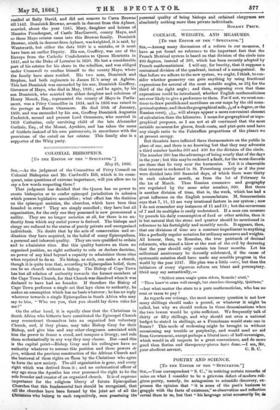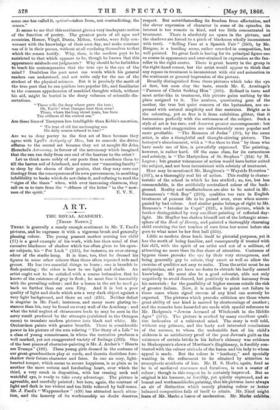POETRY AND SCIENCE.
[To THE EDITOR OF THE "SPECTATOR."] some one has called it, optical—taken from, not contradicting, the
senses."
It seems to me that this sentiment gives a very inadequate notion of the function of poetry. The greatest poets of all ages and countries, Homer, Virgil, Dante, Milton, Goethe, were fully con- versant with the knowledge of their own day, and make constant use of it in their poems, without at all confining themselves to that which the senses testify. Why, then, is the modern poet to be restricted to that which .appears to be, though he knows that this .appearance misleads our judgments? Why should he be forbidden to teach his contemporaries that the true eye is the eye of the mind ? Doubtless the poet must use words which his general readers can understand, and not write only for the use of the student of the physical sciences. But it is precisely the merit of the true poet that he can quicken into popular life, and familiarize to the common apprehension of mankind thoughts which, without his aid, might lie buried in the dusty volumes of scientific dis- sertations.
"There rolls the deep where grew the tree ; Oh, Earth! what changes bast thou seen ! There, where the long street roars, has been The stillness of the central sea."
Are them lines of Tennyson less intelligible than Keble's assertion,
" 'Tie true of old the unchanging sun His daily course refused to run?"
Are we to deny poetry to the first set of lines because they agree with Lyell's Antiquity of Man, but to concede the divine
afflatus to the second set because they set at naught Sir John
Herschel's Astronomy, in favour of the astronomy which imagined that the sun ran daily from one end of the heavens to the other? Let us think more nobly of our poets than to condemn them to
till the barren soil of falsehood, and nurse our "reasoning faculty" to sleep by the charm of their genius, that they may save our theology from the consequences of its own perverseness, in ascribing
infallibility to books which do not claim it, and refusing to read the "signs of the times" when, with ever increasing clearness, they
call on us to turn from the "oldness of the letter" to the "new-































 Previous page
Previous page